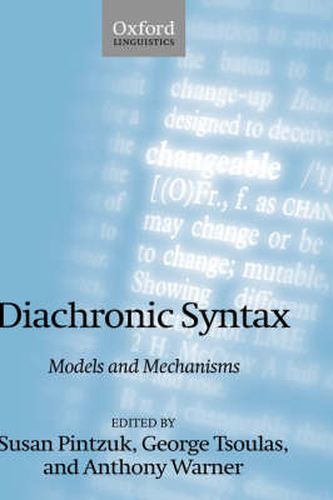Readings Newsletter
Become a Readings Member to make your shopping experience even easier.
Sign in or sign up for free!
You’re not far away from qualifying for FREE standard shipping within Australia
You’ve qualified for FREE standard shipping within Australia
The cart is loading…






Historical syntax occupies a pivotal position within the larger field of research into the nature, use, and acquisition of language. It is responsive to theoretical advances in linguistic theory, language acquisition, and theories of language use, as well as to less adjacent fields such as statistical techniques and evolutionary biology. Linguistic theory has undergone deep changes since the early 1990s, given the widespread impact of Chomsky’s Minimalist Programme, Kayne’s Antisymmetry Theory, and Kayne’s Theory of Overt Movement. This work has brought into sharper focus questions concerning the architecture of linguistic theory that have a direct impact on our understanding of the process of change. At the same time, the recently developed framework of Optimality Theory, which has had a major influence in phonology, is beginning to provide new insights and raise new questions as it is applied to syntax and historical change. This collection of new writing by largely generative-based syntacticians advances this work. This book contains selected material from the Fifth Diachronic Generative Syntax Conference (DIGS 5) held in 1998. The chapters have been chosen to reflect developments in the study of language change and variation, and to exemplify work in a wide range of languages, including Germanic, Romance, Celtic, Slavic, and Sinitic. The book is divided into parts dealing with theoretical frameworks, comparative change, features and categories, and movement. A substantial opening chapter by the editors provides a critical overview of the subject and introduces the following chapters.
$9.00 standard shipping within Australia
FREE standard shipping within Australia for orders over $100.00
Express & International shipping calculated at checkout
Stock availability can be subject to change without notice. We recommend calling the shop or contacting our online team to check availability of low stock items. Please see our Shopping Online page for more details.
Historical syntax occupies a pivotal position within the larger field of research into the nature, use, and acquisition of language. It is responsive to theoretical advances in linguistic theory, language acquisition, and theories of language use, as well as to less adjacent fields such as statistical techniques and evolutionary biology. Linguistic theory has undergone deep changes since the early 1990s, given the widespread impact of Chomsky’s Minimalist Programme, Kayne’s Antisymmetry Theory, and Kayne’s Theory of Overt Movement. This work has brought into sharper focus questions concerning the architecture of linguistic theory that have a direct impact on our understanding of the process of change. At the same time, the recently developed framework of Optimality Theory, which has had a major influence in phonology, is beginning to provide new insights and raise new questions as it is applied to syntax and historical change. This collection of new writing by largely generative-based syntacticians advances this work. This book contains selected material from the Fifth Diachronic Generative Syntax Conference (DIGS 5) held in 1998. The chapters have been chosen to reflect developments in the study of language change and variation, and to exemplify work in a wide range of languages, including Germanic, Romance, Celtic, Slavic, and Sinitic. The book is divided into parts dealing with theoretical frameworks, comparative change, features and categories, and movement. A substantial opening chapter by the editors provides a critical overview of the subject and introduces the following chapters.